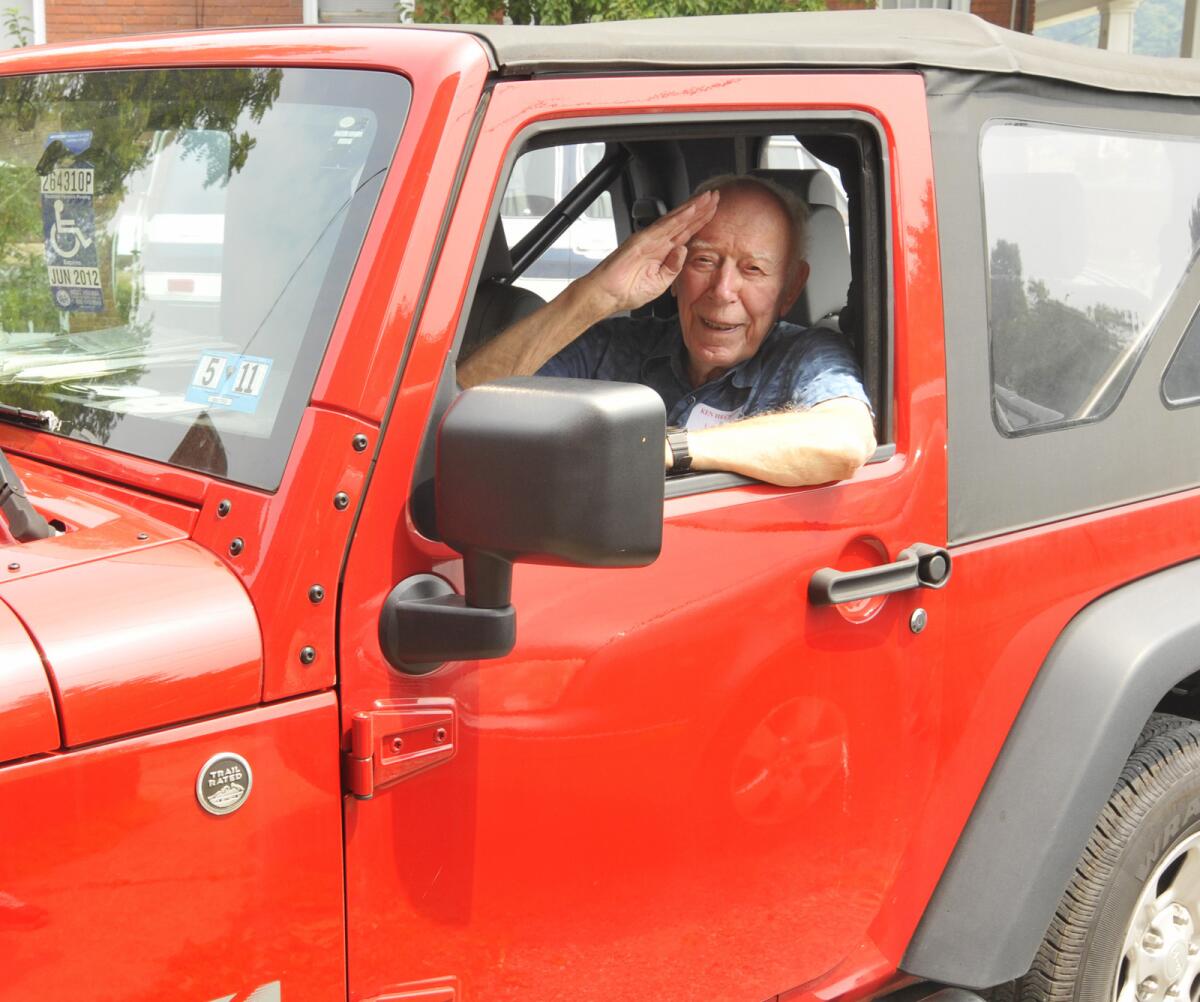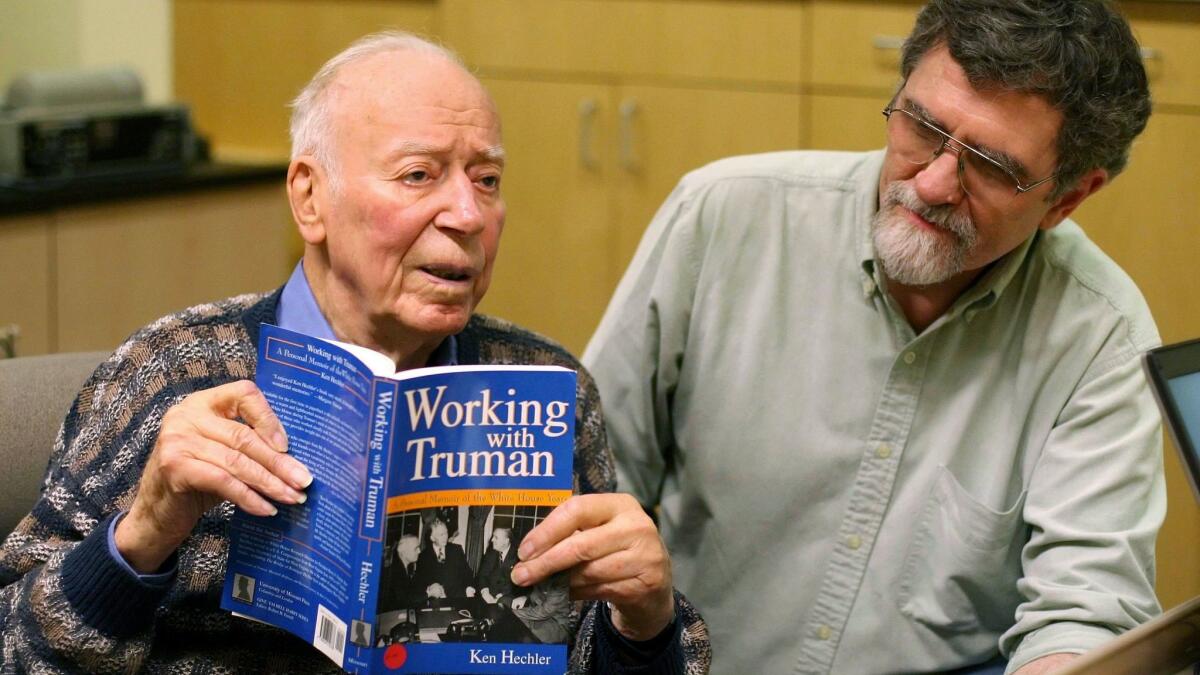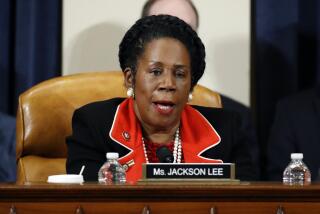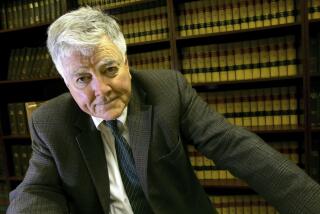Ken Hechler, congressman who fought for miners and marched with Martin Luther King, dies at 102

West Virginia statesman and author Ken Hechler, a nine-term congressman who once worked in the Truman White House and marched with Rev. Martin Luther King Jr., has died. He was 102.
Hechler died Saturday at the family home in Romney, W.Va, his wife Carol said.
For the record:
11:33 p.m. Sept. 19, 2024An earlier version of this article stated that Ken Hechler marched with Martin Luther King Jr. to Selma, Ala. He marched with King from Selma to Montgomery, Ala.
Hechler was a fixture in Washington and his home state, championing civil rights legislation and fighting for coal mine safety, strip mine regulations and black lung compensation.
He later served four terms as West Virginia’s secretary of state, becoming a common sight driving around Charleston in his trademark red Jeep.
An Army combat historian in Europe during World War II, Hechler interviewed generals and front-line soldiers. He later was assigned to interview key German Third Reich leaders before they were charged and tried for war crimes.

After President Truman’s 1948 election to a new term, Hechler landed research projects for the White House and eventually became a special assistant to Truman. He helped compile the official papers of Presidents Franklin D. Roosevelt and Truman.
Among his writings included “The Bridge at Remagen,” a 1955 nonfiction bestseller about a key Allied victory. It became a 1969 film.
Born Sept. 20, 1914, in Roslyn, N.Y., Hechler graduated from Swarthmore College and earned a master’s degree and a doctoral degree in history and government from Columbia University.
Drafted into the Army in 1942, Hechler trained to become a tank commander, although a violation of base regulations at Ft. Knox, Ky., pushed his career in a different direction. In a 1985 interview with the Truman Presidential Museum and Library, he said the camp general caught him writing an autobiography after lights-out.
“I was using a flashlight under my blanket in bed,” Hechler recalled. “He said, ‘This is the most remarkable autobiography. I don’t think you ought to be a tank commander. I think we ought to assign you to something a little bit more useful in the Army.’”
Hechler helped chronicle the 1944 Normandy invasion, the liberation of France, the Battle of the Bulge and the drive into Nazi Germany. In the thick of all but the D-Day landings, Hechler was awarded five battle stars as well as a Bronze Star.
As a captain, Hechler recalled getting a tongue-lashing from Gen. George Patton for smearing the shiny officer’s insignia on his uniform with grease to deter snipers.
After the German surrender, Hechler interviewed field marshals Albert Kesselring and Wilhelm Keitel, Gen. Alfred Jodl, Foreign Minister Joachim von Ribbentrop and supreme marshal Hermann Goering, among others.
Hechler often recounted how Goering offered to lead Germany’s remaining military alongside U.S. forces to “knock hell out of the Russians.”
Hechler returned to teaching at Princeton University following his discharge. After Truman’s 1948 victory, Hechler landed some White House research projects and eventually became a special assistant to Truman, writing speeches and other tasks, including helping the president tailor his whistle-stop train speeches.
In 1957, Hechler landed a teaching job at Marshall University in Huntington, W.Va. and won the district’s U.S. House seat the following year.
While in Congress, Hechler marched from Selma to Montgomery, Ala. with King in 1965. He was reelected eight times before a 1976 failed run for governor.
He was elected secretary of state in 1984. As West Virginia’s chief elections officer, his office helped uncover evidence that then-Mingo County Sheriff Johnie Owens arranged to sell his office for $100,000. Owens was convicted in 1988.
Outspoken on environmental issues, Hechler ran in the 2010 special U.S. Senate race in West Virginia, largely so foes of mountaintop removal mining could register their opposition. He attracted more than 16,000 votes in the Democratic primary.
MORE NOTABLE DEATHS:
Adolf Burger, World War II prisoner forced by Nazis to forge millions in fake money, dies at 99
Greg Lake —founding member of King Crimson and Emerson, Lake and Palmer — dies at 69
John Glenn dies at 95; hero was first American to orbit Earth
More to Read
Start your day right
Sign up for Essential California for the L.A. Times biggest news, features and recommendations in your inbox six days a week.
You may occasionally receive promotional content from the Los Angeles Times.






